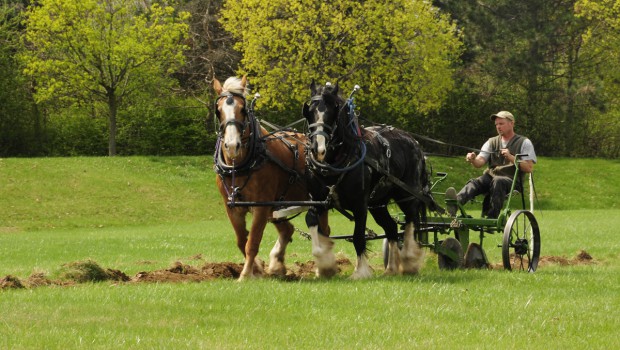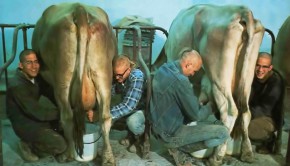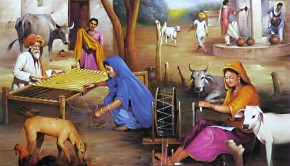Horse-and-Plow Farming Making a Comeback
SISTERS, Ore. (AP) – To some, the thought of a farmer patiently working the field behind a horse and plow might evoke pangs of nostalgia for the early days of agriculture. But in fact, the practice is making a comeback.
Ol’ Dobbin hasn’t run the tractors out of the fields yet. But increasingly, small farmers are finding horse-powered agriculture a workable alternative to mechanization.
Lynn Miller, whose quarterly “Small Farmer’s Journal” tracks horse-farming, estimates about 400,000 people depend in some measure on animal power for farming, logging and other livelihoods. He says the number is on the rise.
Many are Amish farmers in Iowa and Pennsylvania who shun mechanization, but some are farmers who have turned to horses because of the bottom line, citing soaring fuel prices and the ability of the animals to produce their own replacements.
They also say the animals are better for the soil and can be used in wet weather when a tractor often cannot.
Miller, who farms with horses on his own ranch, said the practice began spreading beyond Amish communities about 20 years ago.
“When I started 31 years ago there were no companies making equipment for animal-powered agriculture,” he said in his office in this central Oregon town.
“Fifteen years ago I could count them. Today I have no idea how many there are.”
Miller estimated that 60 percent to 70 percent of those who try horse-and-plow farming stay with it. “It takes a certain personality,” he said. “It’s a craft, not a science.”
Miller said a farmer with horses can earn triple or more the earnings per acre than one farmed by agribusiness.
Ron VanGrunsven farms about 50 acres with horses near Council, Idaho, and has used horses for years there and in Oregon’s Willamette Valley.
“They’re more economical,” he said.
“They raise their own replacements, you can train them yourself and raise their feed.”
A mare can produce a foal every year or so, and Miller says that, if properly trained, one can bring about $2,000 after two years.
A plow horse usually lasts 16 or 18 years, Miller said. He said he looks after his stable of nine carefully and veterinarian bills rarely total 0 a year.
VanGrunsven said a two-horse team and a farmer can plow about an acre and a half a day if the ground is right and that an acre usually produces more than enough hay to feed a horse for a year.
“Most of my equipment is not new,” said VanGrunsven. “It is from the 1930s or earlier. It has been repaired and cleaned up. … The older things were designed so they could be fixed if they broke. When newer things break, they have to be replaced.”
Horse farming was common until the end of World War II, when the government and manufacturers started promoting mechanization to soak up the surplus industrial capacity, Miller said.
Horses could often be used as down payments for tractors, he said, “and they went to the glue factories by the hundreds of thousands.”
On the Net:














my uncle shared a story of how, when he was a pre-schooler, grandpa came in from the field, sat at the table and started to cry. grandma tried to console him, but, sadly, it seems that one of his plow horses had died in the field. just one more heartache during the depression the poor man had to endure.
this breaks my heart…………
Hare Krsna Madhudvisa dasa. I have a small question regarding farming. Is is sinful is it okay to keep plant fields or agricultural fields and keep animals out and prevent large numbers of other life forms or animals from finding their own food.
Hare Krishna Devesh
Yes. Farming is OK. But it can be done in a much more natural way than it is done with today’s chemicals and poisons.
Keeping the animals out of the vegetable patch so they do not eat them does not prevent them from finding their own food. They will find food elsewhere. That food is not meant for them. It should be being grown for offering to Krishna. So if that is the consciousness and the food is used for offering to Krishna then even if there is some apparent sinful action in the production of the food then because it is being done for the pleasure of Krishna that is absorbed by Krishna.
In reality we can not perform any activity in the material world without incurring some sort of sinful activities. The example is given in the Vedas that even when you light a fire for cooking then so many germs and small insects may be killed in the fire and you can not avoid that and even if you walk on the ground then underneath your feet you will be crushing and killing so many small germs and insects. So this is all sinful and generally we would have to suffer the sinful reactions for all these things.
But if you are cooking for Krishna, then whatever sinful reactions are there, they will be absorbed by Krishna, and we will not be responsible for the sinful reactions at all. Similarly if you are walking along the street to perform Sankirtan, chanting that holy names of Krishna, and you are crushing some germs and small insects as you dance down the street in the Sankirtan party, then of course you are walking only to serve Krishna and you will not be responsible for any sinful activities that you inadvertently perform.
So the whole point is that if we transform all our activities so that everything is being done for the pleasure of Krishna then we will not be responsible for any of the sinful activities that will surely be there in any activity that we perform.
Chant Hare Krishna and be happy!
Madhudvisa dasa
Today in my mind i came to question what people say about using pesticides or chemicals so that they all kinds of pests including insects and weeds. And below is the explanation i searched why they use pesticides. And along with the pesticides what about fertilizers especially the inorganic chemical ones. are they dangerous. Are both organic and inorganic dangerous. And one last question. Can purely natural way of farming address these issues.
“Many farmers choose to use chemicals to keep weeds and pests from destroying their crops and to add more nutrients to the soil. There are three different kinds of pesticides; herbicides, insecticides and fungicides. All three of these pesticides are used to kill different kinds of pests that can be found on a farm. Farmers that make the decision not to use any chemicals are called organic farmers.
Plants need nutrients in order to grow on a farm. Nutrients such as carbon, oxygen and hydrogen are always available to the plants. Unfortunately, nutrients that the plants also need such as nitrogen, phosphorus and potassium can run out. To put more of these nutrients back into the soil many farmers will add fertilizers. Replacing these nutrients back into the soil with fertilizers can help the growth of the plant, which then increases the crop yield on the farm.
Because insects make up 3/4 of all species on earth, they can be a big problem on a farm. Insects such as worms and beetles can infest a crop and destroy it. To keep this from happening many farmers will spray their crops with insecticides. Insectisides are strong chemicals that will kill the insects that will harm the crop without killing the actual crop.
One of the biggest concerns for farmers is weed control . When weeds grow in farmland they can damage the crops and decrease the crop yeild of the farm. To get rid of the weeds without killing the crop many farmers spray their fields with herbicides. Herbicides are also made up of strong chemicals.”
Hare Krishna Devesh
Yes. The natural way to control the weeds is by ploughing the earth. They let the weeds grow and then plough them in and that kills them for the time being and they plant the crops so the weeds do not regrow until after the crop. That is the natural way and does not require the poisonous chemicals that also poison the food.
As far as fertilizer that is provided naturally by floods and by the cow dung by growing different crops in the land and not overusing the land.
The traditional way of farming that was current in India and all over the world went on for thousands and thousands of years and there was no need for these poisonous chemicals. You can look up biodynamic farming. That is a system used currently that is very successful and that does not require any of these poisons at all.
We are growing the food to offer to Krishna. We want to offer Krishna pure, natural food. Not poison…
This poison also accumulates in the earth and makes the land unsuitable for growing crops after some years, unlike the natural methods that do not harm the earth.
Chant Hare Krishna and be happy!
Madhudvisa dasa
What was the traditional way of farming that was current in India and the whole world. Would like to know? Would benefit a lot if you mention and explain it?